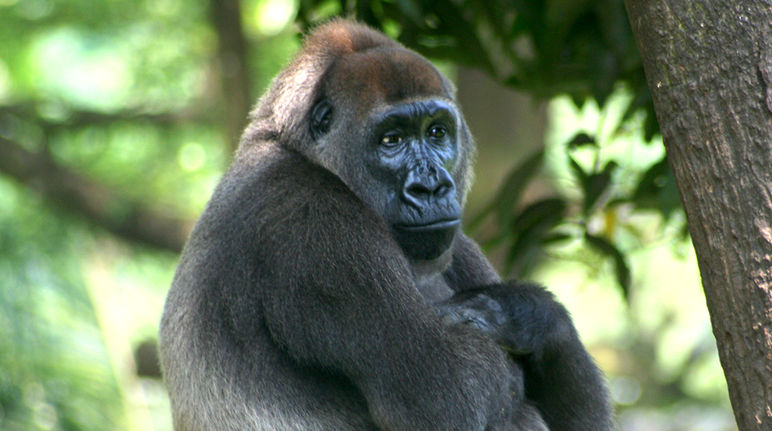Nigeria: oil palms in gorilla habitat?
 Cross River gorillas face extinction if their habitat dwindles further. (© Julielangford - CC BY-SA 3.0)
Cross River gorillas face extinction if their habitat dwindles further. (© Julielangford - CC BY-SA 3.0)
Palm oil giant Wilmar's plantations are encroaching on protected Nigerian forests, including Cross River National Park, the home of critically endangered gorillas. Tell Wilmar and its major buyer Unilever – the manufacturer behind brands such as Dove, Becel, Flora and Hellmann’s – to stop NOW.
Call to actionTo: the boards of Wilmar and Unilever
“Palm oil giant Wilmar is encroaching on protected areas in Nigeria. Stop the expansion immediately.”
The forests of Cross River State in Nigeria are a hotspot of biodiversity and home to the Cross River gorilla, the most critically endangered primate in Africa. Habitat loss is driving them to extinction – less than 300 of the gorillas remain. Locals report that leopards, lions and tortoises have already disappeared from the region. Antelopes, porcupines and cobras are also dwindling.
Wilmar, however, doesn’t see that as an obstacle to its expansion plans. The palm oil giant is encroaching on parts of Cross River National Park and Ekinta River Forest Reserve. Satellite images show that deforestation has accelerated across all of the corporation’s Nigerian holdings since 2011.
People are also feeling the impact: human rights activists estimate that 20,000 are being affected by Wilmar’s activities in Nigeria. The corporation did not obtain the prior, informed consent of locals for its activities and has broken past promises. Cross River smallholders are desperate: “By taking our farms, Wilmar is declaring us dead,” said Ibogo Village Elder Aning Oja. While the villagers were previously able to live sustainably off of their small plots, many are now impoverished. “Wilmar is...bulldozing away people’s lives," says Godwin Ojo, Executive Director of Environmental Rights Action in Nigeria. The organization produced a study with maps and photos detailing Wilmar’s illicit activities.
One of Wilmar’s most important customers is Unilever, the manufacturer behind brands such as Dove, Becel, Flora and Hellmann’s. We therefore consider both corporations to be responsible for rainforest destruction, land grabs and human-rights violations.
Tell Wilmar to stop its expansion immediately and call on Unilever to stop buying palm oil from Wilmar.
BackgroundFurther reading:
Exploitation and Empty Promises – Wilmar's Nigerian land grab
A study by Friends of the Earth US and Environmental Rights Action Nigeria
To: the boards of Wilmar and Unilever
Ladies and Gentlemen,
The forests of Cross River State in Nigeria are a hotspot of biodiversity and home to the Cross River gorilla, the most critically endangered primate in Africa. Furthermore, thousands of villagers in the region live sustainably from the harvests of their small plots.
This is now at risk because of Wilmar’s current massive expansion of its plantations. Satellite images show that deforestation, which has accelerated across all of Wilmar’s Nigerian holdings since 2011, is encroaching on protected areas such as Cross River National Park and Ekinta River Forest Reserve.
The Nigerian NGO Environmental Rights Action and Friends of the Earth have published a detailed study with maps, satellite images and photos documenting the destruction.
In 2013, Wilmar proclaimed a “no deforestation, no peat, no exploitation” policy. By all appearances, that was an empty promise.
We call on Wilmar to cease its deforestation in Nigeria immediately. We also call on Unilever to stop being an accessory to rainforest destruction by sourcing palm oil from Wilmar.
The issue – rainforest on our dinner tables and in our fuel tanks
At 66 million tons annually, palm oil is the most commonly produced vegetable oil. Its low world market price and properties that lend themselves to processed foods have led the food industry to use it in half of all supermarket products. Palm oil can be found in frozen pizzas, biscuits and margarine, as well as body creams, soaps, makeup, candles and detergents.
Few people realize that almost half of the palm oil imported into the EU is used as biofuel. Since 2009, the mandatory blending of biofuels into motor vehicle fuels has been a major cause of deforestation.
Oil palm plantations currently cover more than 27 million hectares of the Earth’s surface. Forests and human settlements have been destroyed and replaced by “green deserts” containing virtually no biodiversity on an area the size of New Zealand.
The impact – suffering and death in producer countries, climate havoc
The warm, humid climate of the tropics offers perfect growth conditions for oil palms. Day after day, huge tracts of rainforest in Southeast Asia, Latin America and Africa are being bulldozed or torched to make room for more plantations, releasing vast amounts of carbon into the atmosphere. As a consequence, Indonesia – the world’s largest producer of palm oil – temporarily surpassed the United States in terms of greenhouse gas emissions in 2015. With their CO2 and methane emissions, palm oil-based biofuels actually have three times the climate impact of traditional fossil fuels.
Palm oil is not only bad for the climate: As their forest habitat is cleared, endangered species such as the orangutan, Borneo elephant and Sumatran tiger are being pushed closer to extinction. Smallholders and indigenous people who have inhabited and protected the forest for generations are often brutally driven from their land. In Indonesia, more than 700 land conflicts are related to the palm oil industry. Human rights violations are everyday occurrences, even on supposedly “sustainable” and “organic” plantations.
As consumers, we are largely unaware of these broader issues, yet our daily palm oil consumption also impacts our health: refined palm oil contains large amounts of harmful fatty acid esters that are known to damage DNA and cause cancer.
The solution – a revolution on our dinner tables and in our fuel tanks
Only 70,000 orangutans still roam the forests of Southeast Asia, yet the EU’s biofuels policy is pushing them to the brink of extinction. Every new plantation on Borneo is destroying a further piece of their habitat. Stepping up the pressure on policymakers is a must if we want to save our tree-dwelling kin. Apart from that, however, there is still a lot we can do in day-to-day life.
Follow these simple tips to recognize, avoid and combat palm oil:
- Enjoy a home-cooked meal: Use your imagination: why not try almond-coconut-pear biscuits? Or pizza with potato and rosemary? A meal cooked from fresh ingredients beats processed foods containing palm oil every time. Oils such as sunflower, olive, rapeseed or flaxseed are ideal for cooking and baking.
- Read labels: As of December 2014, labeling regulations in the EU require food products to clearly indicate that they contain palm oil. However, in the case of non-food items such as cosmetics and cleaning products, a wide range of chemical names may still be used to hide the use of palm oil. A quick check of your favorite search engine will turn up palm oil-free alternatives, however.
- Remember that the customer is king: Ask your retailers for palm oil-free products. Write product manufacturers and ask them why they aren’t using domestic oils. Companies can be quite sensitive to issues that give their products a bad name, so inquiring with sales staff and contacting manufacturers can make a real difference. Public pressure and increased awareness of the problem have already prompted some producers to stop using palm oil.
- Sign petitions and write your elected representatives: Online campaigns put pressure on policymakers responsible for biofuels and palm oil imports. Have you already signed all of Rainforest Rescue’s petitions?
- Speak out: Protest marches and creative action on the street raise public and media awareness of the issue, which in turn steps up the pressure on policymakers.
- Leave your car at home: Whenever you can, walk, ride a bicycle or use public transport.
- Be informed and inform others: Big Business and governments would like us to believe that biofuels are good for the climate and that oil palm plantations are sustainable. Spread the word – share this information with your family and friends and encourage them to rethink their consumption habits. It’s in our hands!













 Recent successes
Recent successes